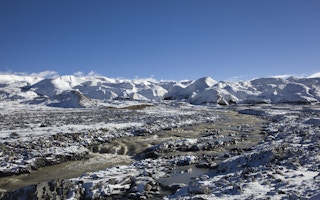Temperatures could be climbing on mountains − with new research suggesting that the highest altitudes may be warming at a rate greater than expected.
Members of the Mountain Research Initiative collective report in Nature Climate Change that they found evidence that mountain peak regions were warming faster than the surrounding plateaus and lowlands.
The study − by Nick Pepin, leader of the Environmental Processes and Change Research Group at Portsmouth University in the UK, and colleagues from the US, Switzerland, Canada, Ecuador, Pakistan, China, Italy, Austria and Kazakhstan − comes with more than the usual set of health warnings.
The authors concede that the evidence is “extremely sparse”. But just as the Arctic region – the high latitudes of the northern hemisphere – is warming faster than anywhere else in the world, so the high altitude could also be at risk. The important thing is to find out.
No long-term data
There are few weather stations above 4,500 metres, and no long-term data for peaks higher than 5,000 metres anywhere in the world. The summit of Kilimanjaro, Africa’s highest mountain, has been monitored longest of all, but measurements have been recorded there on a systematic basis only for the last decade.
Other indications come from the Tibetan plateau, where temperatures recorded at 139 stations have risen steadily over the past 50 years, and the rate of change is accelerating.
“There is growing evidence that high mountain regions are warming faster than lower elevations,” Dr Pepin say. “Such warming can accelerate many other environmental changes, such as glacial melt and vegetation change, but scientists urgently need more and better data to confirm this.
“If we are right, and mountains are warming more rapidly than other environments, the social and economic consequences could be serious, and we could see much more dramatic changes sooner than previously thought.”
There are two obvious causes for concern, the first being the simple problem of biodiversity. Plants and animals that occupy the highest elevations are at the optimum limits of their climatic tolerance, and if the climate gets warmer, they must move uphill to survive.
There is already evidence from alpine Switzerland that this is indeed happening. But those species already at the highest altitudes have nowhere else to go − and so face extinction.
The second concern relates to an even more immediate impact. The highest mountain regions are glaciated, and this store of winter snow and ice becomes a source of spring and summer meltwater on which farmers, cities and even whole nations have grown to depend.
There is also good evidence that glaciers are in retreat, almost everywhere in the world. So the economic consequences could be considerable.
Endangered species
“This alone requires that close attention be paid to the issue,” the authors write. “In addition, mountains provide habitat for many of the world’s rare and endangered species, and the presence of many different ecosystems in close proximity enhances the ecological sensitivity of mountains to environmental change.”
In essence, the study incorporates a warning: more evidence is needed.
Raymond Bradley, who directs the Climate System Research Centre at the University of Massachusetts Amherst, spells it out: “We are calling for special efforts to be made to extend scientific observations upwards to the highest summits to capture what is happening across the world’s mountains.
“We also need a strong effort to find, collate and evaluate observational data that already exists wherever it is in the world. This requires international collaboration.”








